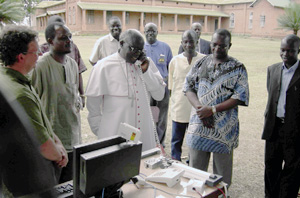
Archbishop Odama of Gulu places the first VoIP call from the Gulu Hub site to the Pabbo IDP camp 70 km away. Credits: BOSCO
Give the poorest in rural Northern Uganda a voice through wireless internet, boost literacy, increase development and raise awareness about human rights violations. In 2005, an ambitious project with these objectives started out in the Archdiocese of Gulu, Northern Uganda.
The many displaced people and marginalised rural populations who had suffered from two decades of conflict, most of them illiterate, were to be connected with the outside world.
“People can now get in touch with neighbouring communities and also relatives or NGOs abroad. In case of human rights violations by government officials or rebels, such as rape or abduction, the communities can alert us and then we can act much more quickly than before,“ said John Bosco Komakech Aludi, Director of Caritas Gulu.
“It is also a way of raising awareness about these problems abroad and improving education.”
Beneficiaries are from rural areas in Northern Uganda. Most of them have no access to electricity. BOSCO stands for Battery Operated Systems for Community Outreach.
The computers work with small solar panels that can easily provide the necessary power supply in Northern Uganda’s sunny climate. With half a day of sun, they can provide 6 or 7 hours of power for the computer.
“Teenagers use this technology to make appointments for football matches and other activities between communities. And then, like any young people, they also like to play games, listen to the latest music and communicate through social networks. And this in area where a majority, even among teenagers, are still illiterate, ”said Mr. Komakech.
“When they see what the internet can offer them, many make an effort to improve their reading skills. This project promotes the idea that education is useful”.
Caritas supported the BOSCO initiative through lobbying work, helping its director Rev. Joseph Okumu to travel to Australia for fundraising or providing office space within Caritas Gulu and teachers to train the villagers. Now, Caritas also benefits from the results.
“We meet on a regular basis with local priests and social workers, but it is always complicated to have people come to our offices. With internet, things are just faster. The other day for example, two priests presented the idea to plant trees at specific locations in their dioceses. The locals know best what is needed in their communities, so this kind of information can help us improve the allocation of our resources”, said Mr. Komakech.
Some villages are at a 50 km distance from the next town and transportation can be difficult. With internet, Caritas staff do not need to go to the villages all the time and can plan their visits ahead to spend their time more wisely. So the computers also help them save a lot of time and expenses.
“The visible impact is great, but I believe there are more positive indirect consequences. Sharing ideas, best practices and success stories, especially on a local basis, can make a real difference. Communication is a major factor of development”, said Mr. Komakech.
Today, BOSCO Uganda provides high-speed wireless Internet to 22 different sites in the post-conflict Amuru and Gulu districts. Computers are given to groups, such as youth groups in schools, parishes or NGOs. They are responsible for the material as a group. This way, people can supervise and help each other and can make sure that the computers are not lost or damaged.
BOSCO is planning to expand the project to other regions in Uganda and South Sudan. Recently, the project was awarded the 2010 Breaking Borders award, which honours groups or individuals using the Internet to promote freedom of expression. This recognition will provide further funding and raise awareness about the project.
Despite the great success of BOSCO, challenges remain. A coordinating office in Gulu with three staff needs to be maintained to monitor the whole system and train the new internet users. A lot of training is needed to have the rural population catch up on computer skills.
“Even the Ugandan government got interested in our project, they want to copy the system to improve communication with local governments. But more funds are needed to make this initiative a real success. More education projects for the illiterate would be complementary for example. Much more needs to be done to bring this technology to all households in rural Uganda,” said Mr. Komakech.
